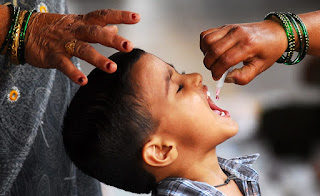Union health minister J.P. Nadda inaugurated pentavalent vaccines in Maharashtra with much fanfare on Monday, but the state lacks the infrastructure to investigate the associated health issues of infants before vaccinating them, which can lead to hospitalisation and death.
Every year, thousands of children are injected with vaccines to bring down the mortality rate. Most of the newborns are provided with vaccines within the first few weeks of birth. But there are many cases where infants succumb after vaccination due to ‘Adverse Effect of Immunisation’, known as AEFI.
On November 21, a two-month-old child died in Chandrapur district within 48 hours of vaccination. Following this, the Maharashtra health department prohibited the use of the diptheria-tetanus-pertussis (DTP) vaccine of a
particular batch.
Like this, several such cases have been reported in the state. In a reply to a Right to Information (RTI) query, the Union health department said that 12 infants died in 2014 in the state after vaccination. According to the World Health Organisation (WHO), any death occurring within 48 hours of being vaccinated has to be suspected to have been caused by the vaccine. However, officials maintain the deaths were caused not by vaccines but associated causes. The Asian Age has the documents where the AEFI committee, which looks into AEFI-related cases, has revealed the causes of deaths in cases where children are provided with pentavalent vaccines in other states.
In many cases, the causes of deaths remain unknown due to insufficient documentation or incomplete hospital records. In other cases, associated causes like heart disease, malnutrition, and fever among others lead to the death of the child. However, in some cases, the AEFI committee accepted, ‘a consistent casual association to immunissation’.
“If such children died because of their health reasons, then why are they given vaccination in the first place knowing that it can lead to complication and deteriorate the health condition? And why does the child die within 48 hours after getting vaccinated?” asks Dr Jacob M. Puliyel, department of paediatrics, St Stephen’s Hospital, Delhi.
Before vaccinating children, doctors check their health conditions but this process has several loopholes in the investigations. “We generally check if the child has fever or other problems identified by stethoscope. But many times, parents, due to stigma or lack of knowledge, don’t reveal the diseases and we can’t identify it only by general treatment,” said Dr Bakul Jayant Parekh, president of Indian Association of Pediatric (IAP)-Mumbai.
When The Asian Age asked Dr Pradeep Halder, deputy commissioner at MoHFW, he said, “All these claims are false. The deaths are related to coincidental causes like if a child is allergic to vaccine or any other associated diseases.” When asked if the state health department has the infrastructure to do in-depth investigation of children before vaccinating them, he replied, “Thousands of children are vaccinated every year. We can’t do thorough check-ups but we track all children after vaccinations to identify such cases. When such cases are reported, we do thorough analysis.”
Every year, thousands of children are injected with vaccines to bring down the mortality rate. Most of the newborns are provided with vaccines within the first few weeks of birth. But there are many cases where infants succumb after vaccination due to ‘Adverse Effect of Immunisation’, known as AEFI.
On November 21, a two-month-old child died in Chandrapur district within 48 hours of vaccination. Following this, the Maharashtra health department prohibited the use of the diptheria-tetanus-pertussis (DTP) vaccine of a
particular batch.
Like this, several such cases have been reported in the state. In a reply to a Right to Information (RTI) query, the Union health department said that 12 infants died in 2014 in the state after vaccination. According to the World Health Organisation (WHO), any death occurring within 48 hours of being vaccinated has to be suspected to have been caused by the vaccine. However, officials maintain the deaths were caused not by vaccines but associated causes. The Asian Age has the documents where the AEFI committee, which looks into AEFI-related cases, has revealed the causes of deaths in cases where children are provided with pentavalent vaccines in other states.
In many cases, the causes of deaths remain unknown due to insufficient documentation or incomplete hospital records. In other cases, associated causes like heart disease, malnutrition, and fever among others lead to the death of the child. However, in some cases, the AEFI committee accepted, ‘a consistent casual association to immunissation’.
“If such children died because of their health reasons, then why are they given vaccination in the first place knowing that it can lead to complication and deteriorate the health condition? And why does the child die within 48 hours after getting vaccinated?” asks Dr Jacob M. Puliyel, department of paediatrics, St Stephen’s Hospital, Delhi.
Before vaccinating children, doctors check their health conditions but this process has several loopholes in the investigations. “We generally check if the child has fever or other problems identified by stethoscope. But many times, parents, due to stigma or lack of knowledge, don’t reveal the diseases and we can’t identify it only by general treatment,” said Dr Bakul Jayant Parekh, president of Indian Association of Pediatric (IAP)-Mumbai.
When The Asian Age asked Dr Pradeep Halder, deputy commissioner at MoHFW, he said, “All these claims are false. The deaths are related to coincidental causes like if a child is allergic to vaccine or any other associated diseases.” When asked if the state health department has the infrastructure to do in-depth investigation of children before vaccinating them, he replied, “Thousands of children are vaccinated every year. We can’t do thorough check-ups but we track all children after vaccinations to identify such cases. When such cases are reported, we do thorough analysis.”


No comments :
Post a Comment